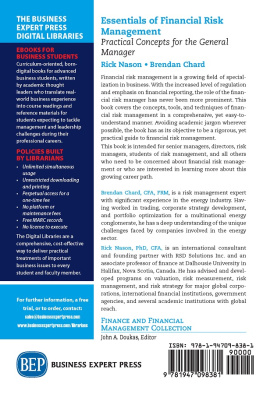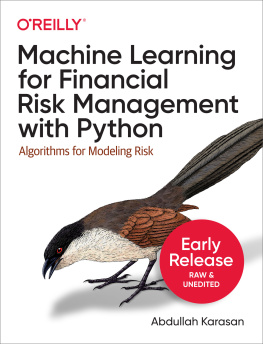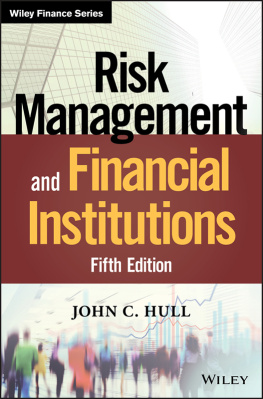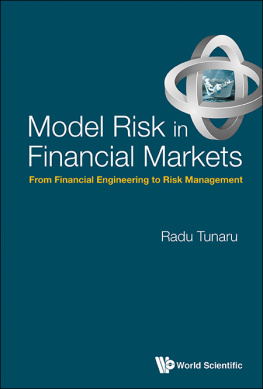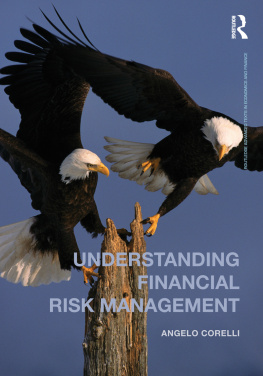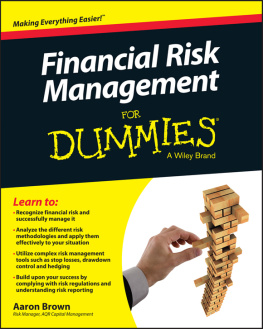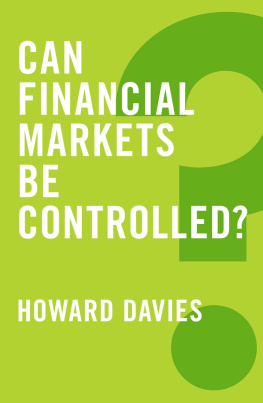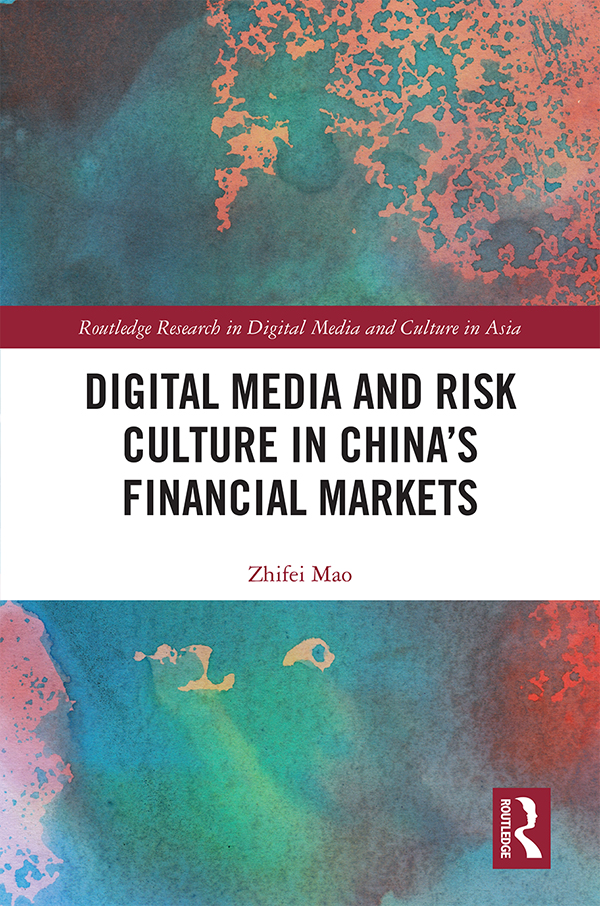Contents
Digital Media and Risk Culture in Chinas Financial Markets
This book analyzes the risk cultures in China that have emerged from the entanglement of new communication technologies and financial markets, examining the role that digital media play in Asian modernity and offering an alternative narrative to that of the West. The book illustrates the impact of exclusively Chinese digital media on power dynamics within risk definition, arguing that information and communication technologies (ICTs) empower individuals, enabling them to compete with an expert-oriented risk culture controlled by Government- and banker-led media outlets. With struggles, competitions, compromises, and confrontations, major communicators in financial world are collectively producing risk cultures based on interpersonal relations instead of contractual obligations, in which insider information is valued over professional analysis. Meanwhile, investors are trapped in a risk culture paradox that they themselves have produced, as they attempt to take advantage of other actors uncertainties and eventually produce risks for the entire market.
Zhifei Mao is an Assistant Professor in the School of Mass Communication at Shenzhen University, China. She was invited to the research team for the European Research Council project Methodological Cosmopolitanism In the Laboratory of Climate Change led by Professor Ulrich Beck from Ludwig Maximilian University of Munich as a postdoctoral fellow. Later she worked as a postdoctoral fellow in the School of Journalism and Communication, the Chinese University of Hong Kong. Her research interests are in global risk, environmental communication, new media studies, and financial communication.
Digital Media and Risk Culture in Chinas Financial Markets
Zhifei Mao

First published 2019
by Routledge
52 Vanderbilt Avenue, New York, NY 10017
and by Routledge
2 Park Square, Milton Park, Abingdon, Oxon OX14 4RN
Routledge is an imprint of the Taylor & Francis Group, an informa business
2019 Taylor & Francis
The right of Zhifei Mao to be identified as author of this work has been asserted by her in accordance with sections 77 and 78 of the Copyright, Designs and Patents Act 1988.
All rights reserved. No part of this book may be reprinted or reproduced or utilised in any form or by any electronic, mechanical, or other means, now known or hereafter invented, including photocopying and recording, or in any information storage or retrieval system, without permission in writing from the publishers.
Trademark notice: Product or corporate names may be trademarks or registered trademarks, and are used only for identification and explanation without intent to infringe.
Library of Congress Cataloging-in-Publication Data
Names: Mao, Zhifei, 1951 author.
Title: Digital media and risk culture in Chinas financial markets / Zhifei Mao.
Description: New York, NY: Routledge, 2018. | Series: Routledge research in digital media and culture in Asia; 2 | Includes bibliographical references and index.
Identifiers: LCCN 2018043495
Subjects: LCSH: Capital marketChina. |
Electronic trading of securitiesChina. |
Financial riskChina. | FinanceInformation technologyChina. | Digital mediaChina.
Classification: LCC HG5782 .M378 2018 | DDC 332/.04150951dc23
LC record available at https://lccn.loc.gov/2018043495
ISBN: 978-1-138-89583-6 (hbk)
ISBN: 978-1-315-17931-5 (ebk)
Typeset in Sabon
by codeMantra
Routledge Research in Digital Media and Culture in Asia
Edited by Dal Yong Jin, Simon Fraser University
Chinese Social Media
Social, Cultural, and Political Implications
Edited by Mike Kent, Katie Ellis, and Jian Xu
Digital Media and Risk Culture in Chinas Financial Markets
Zhifei Mao
I would like to take this chance to express my thanks to all the participants of my research of Chinas stock markets, from those fund managers, government officials, stock commentators, journalists, and editors, to the numerous small investors who shared with me generously their special experiences in the financial world. Some investors are so kind to let me follow them to their homes and working places for observation. Without their help, I could not have approached the construction of financial risk on the individual level.
I would like to thank the book editor, Professor Dal Yong Jin, and my Ph.D. supervisor, Professor Saskia Witteborn, for all of their support and encouragement. And I would like to thank Professor Jack Qiu Linchuan, who shares with me his insights on the issue of class, personal relations, and political economy related to Chinas society. I also appreciate the help from the financial experts like Zhou Xunyu, Professor at Columbia University, and Alex Preda, Professor at Kings College London. Many thanks go to Professor Scott Lash, too, who has introduced risk culture as a concept in his impressive work.
I would like to thank Professor Ulrich Beck, who had invited me into the team of his global project of risk and discussed with me his insightful ideas about risk from the field of sociology. His risk society theory has inspired me to examine financial risk at the very beginning. And I would like to thank Mr. Albert Grber and all the team members of Professor Becks project for their great supports and encouragements.
I would like to thank my family members who are always there for me. Special thanks to my parents, Zhou Xue and Mao Zhongqintheir unwavering trust, support, and love are the very source of energy of mine. I would like to thank my dearest husband and son, too, who give me great support and happiness all the time.
Contents
It was 11:05 am on August 16, 2013. Numbers on a big digital screen suddenly started turning red
This chaotic scene continued as people began making phone calls, gathering in groups, and surfing the Internet with their cell phones and iPads. Mr. Huang, a small investor in his fifties, recalled that he was among the ones who turned to the Internet for help: Online sources are full of rumors. But anyway, the Internet is far faster than TV in delivering real-time information, so we looked online to find the truth (about the sudden market surge). Another participant in my research shared a similar experience:
It was totally chaotic, a mess, I mean it. Rumors were anywhere. We tried hard to find out what was going on, if it was a great chance or a risky trap. Some investors in my exchange hall truly believed that there was really good news about to be released, and they bought a lot of stocks that day.
Meanwhile, online commentators posted thousands of microblogs about the unusual upsurge in stock prices on the biggest social network site in China, Sina Weibo. The sharp increase seemed to come out of nowhere. Some people suspected that the surge resulted from some sort of mechanical problem in the financial transaction system. Others believed that the Chinese government was preparing to release some game-changing policies that would stimulate the market. Xia, a university student majoring in business management, was in his computer class when this event occurred. He busily checked peoples messages on his smartphone and tried to trade stocks using his app, all while cautiously avoiding the professors attention. He wrote a post on his own Sina Weibo account that morning with excitement: Damn it, the markets crazy. I am in, guys.


